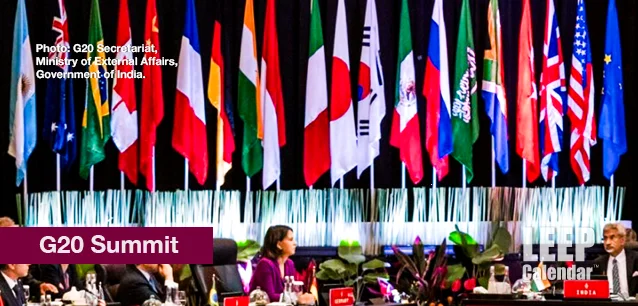 AD
AD
Today is: August 11
Scroll to explore events active on this date.
Additional Events on LEEP
LEEP INK FEATURES

August? Absolutely!
In August, we live through the Dog Days of Summer. It's hot and often humid, and those who can leave for better climates do. Down south, winter is in full force. August is also known as "the ...

In The Heat of July: July 2025 Events
Is it hot enough (or cold enough if you're below the equator) for you yet? There is actually a day for that! Like every month, I pick a diverse collection of events you may or may not know about. This ...

May Blooms: Events in May 2025
Along with October, May is one of the most densely packed months of the year. It's before the summer humidity and the last whole month of the school year. The weather is warming in t...
About the G20 Leadership Summit
Finance & Banking , Conferences & Symposiums
India
Ends: Sep 10, 2023
DESCRIPTION:
The G20 Summit, or Group of Twenty, is an international forum for the governments and central bank governors from 19 countries and the European Union (EU). Together, the members of the G20 represent about two-thirds of the world population, 85% of global gross domestic product (GDP), and around 75% of international trade.
The organization was founded in 1999 in response to the financial crises of the late 1990s to bring together the world's major advanced and emerging economies to stabilize the global financial market. Initially, it was a meeting of Finance Ministers and Central Bank Governors; the G20 Leaders' level was introduced in 2008 in response to the global financial crisis.
The primary purpose of the G20 is to coordinate policy responses among the major economies to ensure global economic stability and sustainable growth. It also focuses on other significant global issues, such as climate change, labor issues, international security, and development.
The G20 consists of 19 individual countries, including major economies like the United States, China, Japan, Germany, the United Kingdom, India, and Brazil. The European Union is also a member. Its meetings occur regularly throughout the year at various levels, including finance, foreign, and other functional ministers. The Leaders' Summit, attended by the heads of state or government of the member countries, is the most prominent event and usually occurs annually.
The leadership of the G20 rotates annually among its members, and the country holding the presidency is responsible for setting the agenda for the year and hosting the Leaders' Summit. The presidency follows a fixed sequence, and each year a different country takes the lead in coordinating the group's work.
The G20 has played a crucial role in responding to global challenges. During the 2008 financial crisis, the G20 coordinated fiscal and monetary measures to stabilize the global economy. More recently, it has focused on sustainable development, global health (including COVID-19 response), and climate change.
While the forum has been instrumental in coordinating international economic policy, it also faces criticisms. Some argue that the G20 needs more representativeness, excluding many smaller and poorer nations. Others criticize the need for enforcement mechanisms, as the G20's decisions are non-binding, and member countries are not obligated to implement the agreed-upon policies.
However, the G20 Summit is vital in global economic governance, providing a platform for dialogue and cooperation among the world's leading economies. Its broad agenda reflects the complexity of global economic and social challenges, and its decisions and initiatives often have significant implications for international policies and trends. By fostering collaboration across various domains, the G20 seeks to promote a stable and prosperous global economy, but it continues to face challenges in inclusivity and effectiveness.
VIDEOS
SUPPORTING DOCUMENTS
Currently, this event does not have supporting documents.
ADDITIONAL IMAGES
Currently, this event does not have supporting images.
Where would you like to go now?
 AD
AD


/footer-logo.svg)
